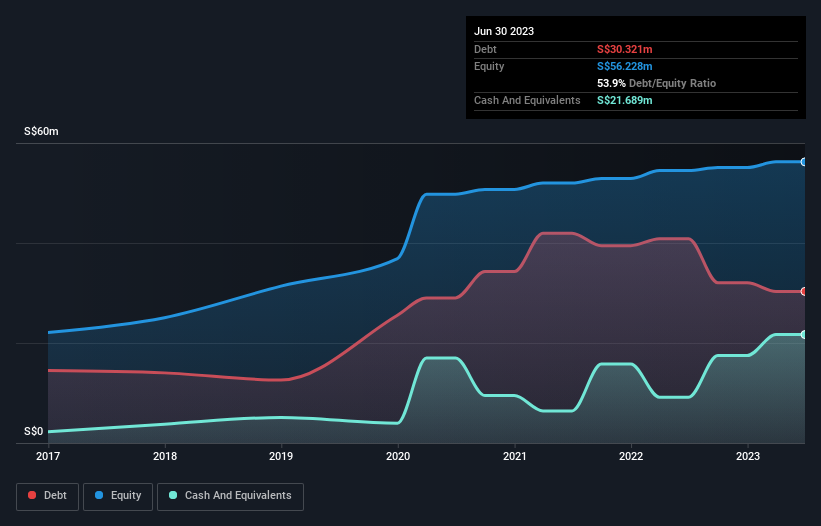
David Iben put it well when he said, 'Volatility is not a risk we care about. What we care about is avoiding the permanent loss of capital.' It's only natural to consider a company's balance sheet when you examine how risky it is, since debt is often involved when a business collapses. As with many other companies Wei Yuan Holdings Limited (HKG:1343) makes use of debt. But the real question is whether this debt is making the company risky.
Why Does Debt Bring Risk?
Debt is a tool to help businesses grow, but if a business is incapable of paying off its lenders, then it exists at their mercy. Ultimately, if the company can't fulfill its legal obligations to repay debt, shareholders could walk away with nothing. However, a more common (but still painful) scenario is that it has to raise new equity capital at a low price, thus permanently diluting shareholders. By replacing dilution, though, debt can be an extremely good tool for businesses that need capital to invest in growth at high rates of return. When we examine debt levels, we first consider both cash and debt levels, together.
Check out our latest analysis for Wei Yuan Holdings
How Much Debt Does Wei Yuan Holdings Carry?
You can click the graphic below for the historical numbers, but it shows that Wei Yuan Holdings had S$30.3m of debt in June 2023, down from S$40.9m, one year before. However, because it has a cash reserve of S$21.7m, its net debt is less, at about S$8.63m.

How Strong Is Wei Yuan Holdings' Balance Sheet?
We can see from the most recent balance sheet that Wei Yuan Holdings had liabilities of S$47.0m falling due within a year, and liabilities of S$6.01m due beyond that. Offsetting these obligations, it had cash of S$21.7m as well as receivables valued at S$48.5m due within 12 months. So it can boast S$17.1m more liquid assets than total liabilities.
This excess liquidity is a great indication that Wei Yuan Holdings' balance sheet is almost as strong as Fort Knox. On this view, lenders should feel as safe as the beloved of a black-belt karate master.
In order to size up a company's debt relative to its earnings, we calculate its net debt divided by its earnings before interest, tax, depreciation, and amortization (EBITDA) and its earnings before interest and tax (EBIT) divided by its interest expense (its interest cover). The advantage of this approach is that we take into account both the absolute quantum of debt (with net debt to EBITDA) and the actual interest expenses associated with that debt (with its interest cover ratio).
Wei Yuan Holdings has a very low debt to EBITDA ratio of 0.96 so it is strange to see weak interest coverage, with last year's EBIT being only 2.5 times the interest expense. So while we're not necessarily alarmed we think that its debt is far from trivial. We saw Wei Yuan Holdings grow its EBIT by 8.6% in the last twelve months. That's far from incredible but it is a good thing, when it comes to paying off debt. When analysing debt levels, the balance sheet is the obvious place to start. But it is Wei Yuan Holdings's earnings that will influence how the balance sheet holds up in the future. So when considering debt, it's definitely worth looking at the earnings trend. Click here for an interactive snapshot.
Finally, a company can only pay off debt with cold hard cash, not accounting profits. So we always check how much of that EBIT is translated into free cash flow. Over the last two years, Wei Yuan Holdings actually produced more free cash flow than EBIT. There's nothing better than incoming cash when it comes to staying in your lenders' good graces.
Our View
The good news is that Wei Yuan Holdings's demonstrated ability to convert EBIT to free cash flow delights us like a fluffy puppy does a toddler. But the stark truth is that we are concerned by its interest cover. Overall, we don't think Wei Yuan Holdings is taking any bad risks, as its debt load seems modest. So the balance sheet looks pretty healthy, to us. When analysing debt levels, the balance sheet is the obvious place to start. But ultimately, every company can contain risks that exist outside of the balance sheet. To that end, you should learn about the 3 warning signs we've spotted with Wei Yuan Holdings (including 1 which is a bit concerning) .
If you're interested in investing in businesses that can grow profits without the burden of debt, then check out this free list of growing businesses that have net cash on the balance sheet.
Valuation is complex, but we're here to simplify it.
Discover if Wei Yuan Holdings might be undervalued or overvalued with our detailed analysis, featuring fair value estimates, potential risks, dividends, insider trades, and its financial condition.
Access Free AnalysisHave feedback on this article? Concerned about the content? Get in touch with us directly. Alternatively, email editorial-team (at) simplywallst.com.
This article by Simply Wall St is general in nature. We provide commentary based on historical data and analyst forecasts only using an unbiased methodology and our articles are not intended to be financial advice. It does not constitute a recommendation to buy or sell any stock, and does not take account of your objectives, or your financial situation. We aim to bring you long-term focused analysis driven by fundamental data. Note that our analysis may not factor in the latest price-sensitive company announcements or qualitative material. Simply Wall St has no position in any stocks mentioned.
About SEHK:1343
Wei Yuan Holdings
An investment holding company, provides civil engineering services in Singapore.
Flawless balance sheet and good value.
Market Insights
Community Narratives





